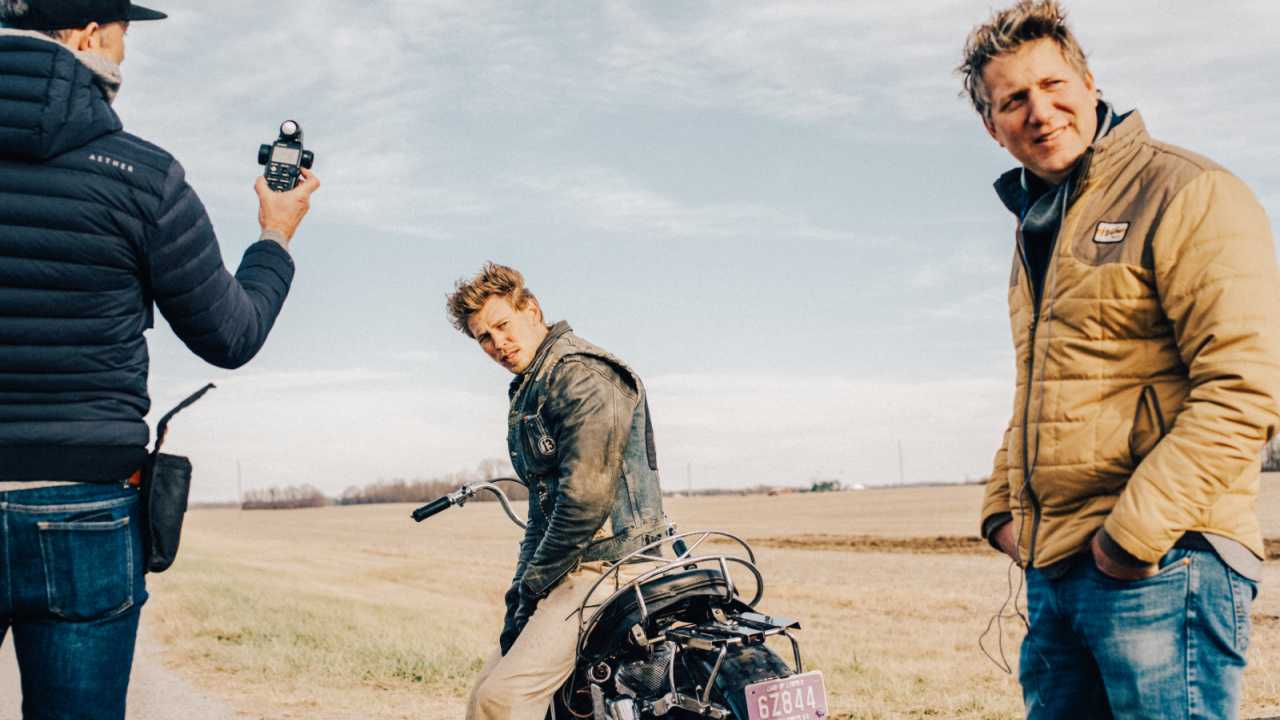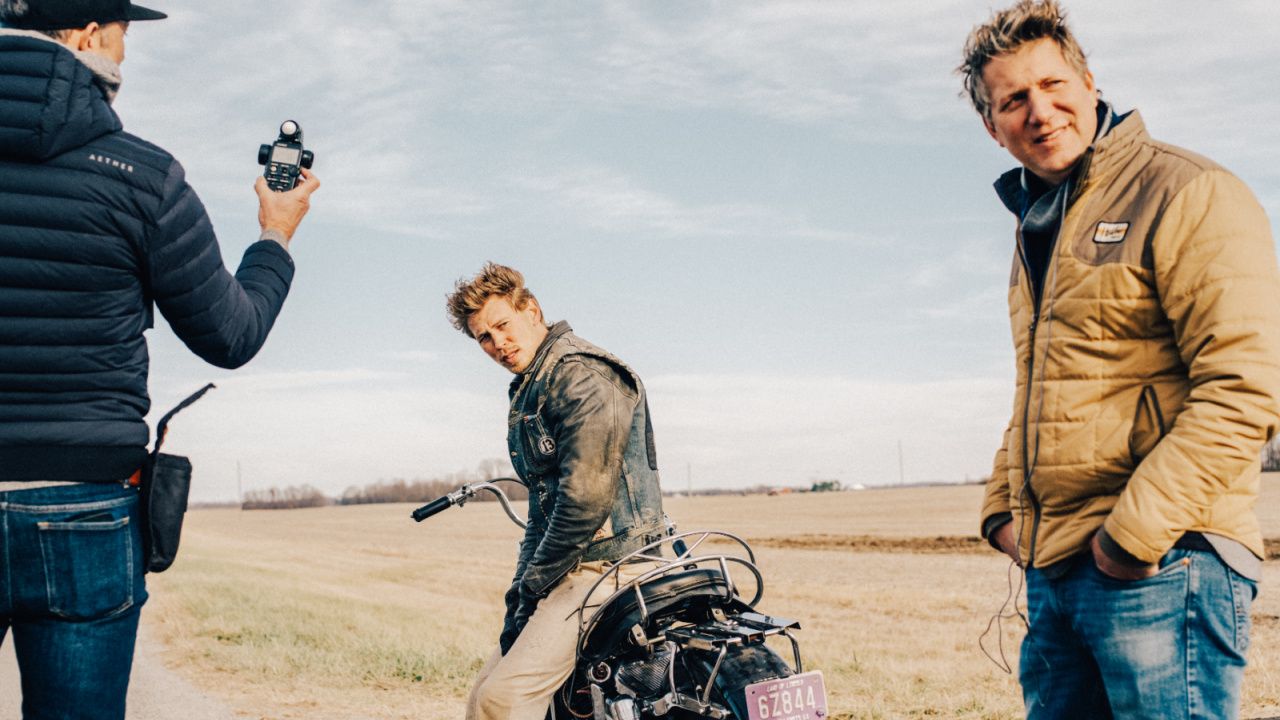
(L to R) Director of photography Adam Stone, actor Austin Butler and director Jeff Nichols on the set of ‘The Bikeriders’, a Focus Features release. Credit: Kyle Kaplan/Focus Features. © 2024 Focus Features. All Rights Reserved.
Available to own or rent at home beginning July 9th is the new film ‘The Bikeriders,’ which was written and directed by Jeff Nichols (‘Mud,’ ‘Loving’) and based on the book of the same name by author Danny Lyon.
The movie features an all-star cast that includes Jodie Comer (‘Free Guy’), Austin Butler (‘Elvis’), Tom Hardy (‘Venom’), Michael Shannon (‘Man of Steel’), Mike Faist (“Challengers’), Boyd Holbrook (‘Indiana Jones and the Dial of Destiny’), and Norman Reedus (‘The Walking Dead’).
Moviefone recently had the pleasure of speaking with writer and director Jeff Nichols about the digital release of ‘The Bikeriders’, his passion for the project, the structure of the film, Jodie Comer and Austin Butler’s onscreen chemistry, Tom Hardy’s performance, the challenges of shooting the motorcycle scenes, and why he loves working with Michael Shannon.
Related Article: Movie Review: ‘The Bikeriders’
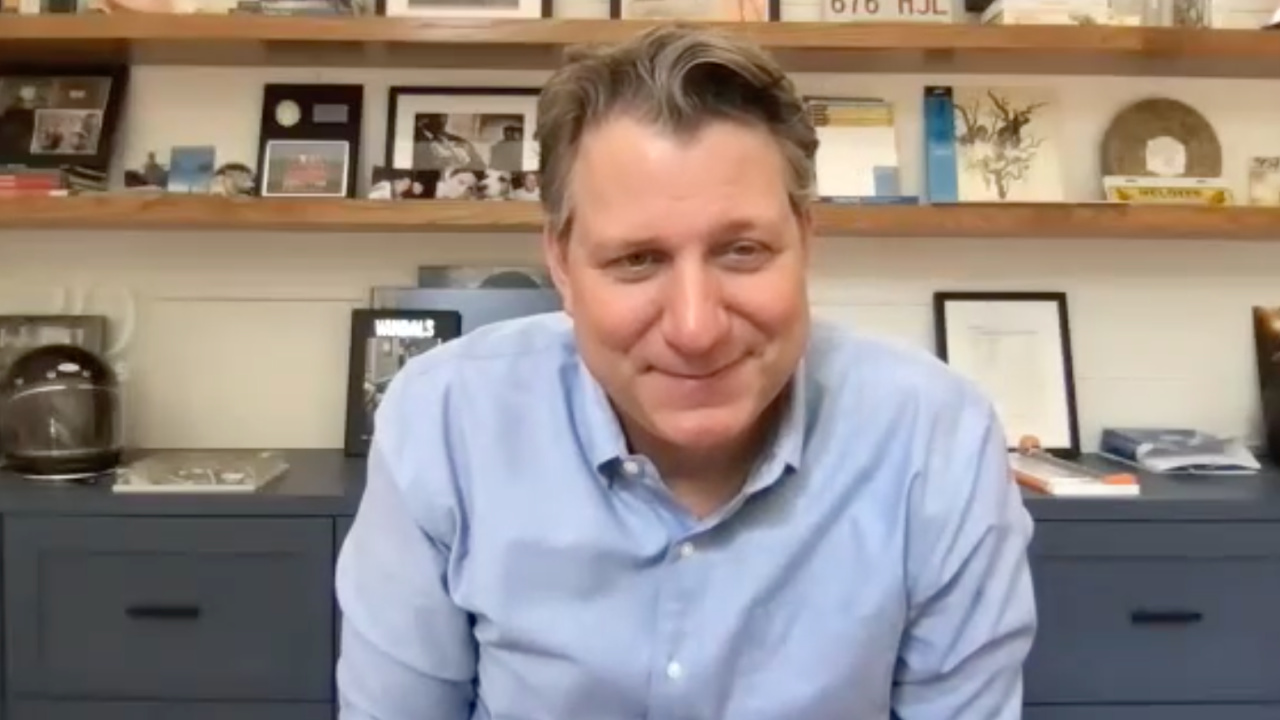
Director Jeff Nichols talks ‘The Bikeriders,’ which is available to own or rent at home beginning July 9th.
Moviefone: To begin with, I know that making ‘The Bikeriders’ was a long passion project for you. Now that the movie is finishing its theatrical run and about to be released on digital, how does it feel to know that audiences are finally seeing this film?
Jeff Nichols: It feels great. The responses that I think I appreciate the most are from people involved in motorcycle culture, not having grown up in that culture and around bikes, especially not growing up in the Midwest, growing up in the American South. Anytime someone says, “Hey, I grew up in Chicago in the 60s and my dad rode bikes, or I was around bikes, and man, you just nailed it.” Like any comments, and I’ve gotten a few of those. They seem to mean the most to me just because it is a kind of pat on the back and it’s a little bit of validation to all the work we did. So yeah, that’s it. I think that’s the thing that’s been most enjoyable for me.
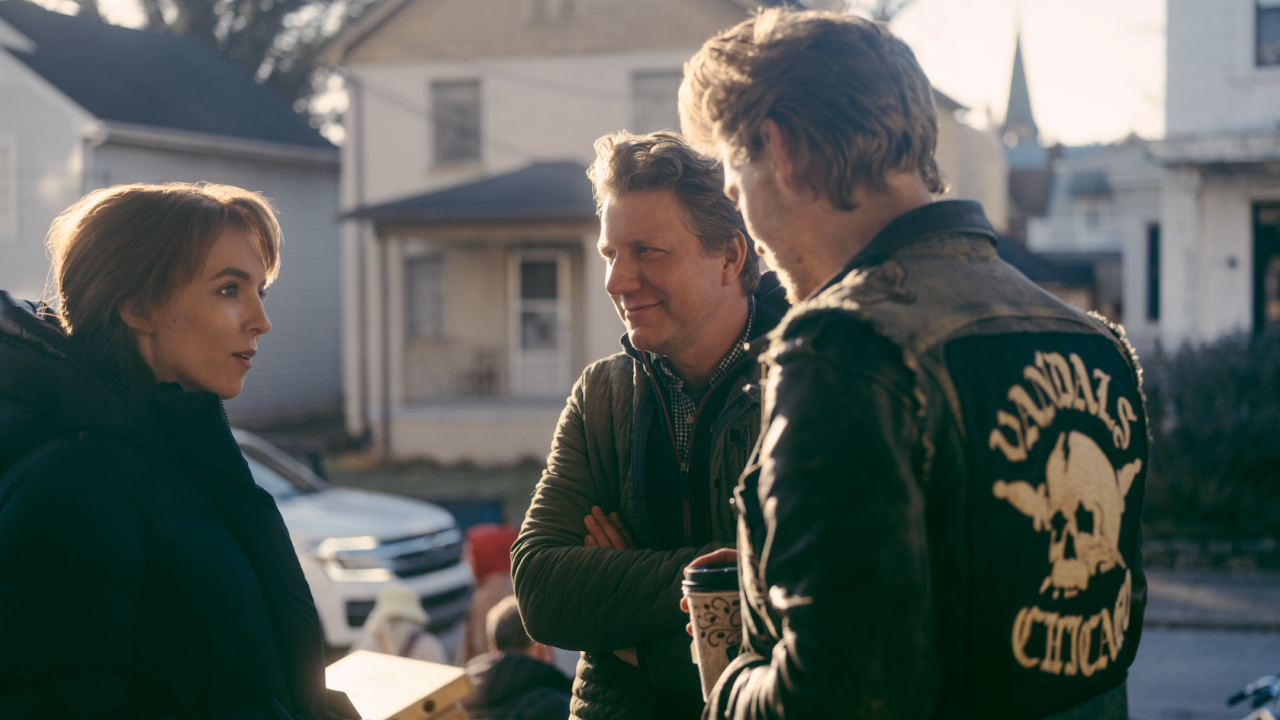
(L to R) Jodie Comer stars as Kathy, director Jeff Nichols and Austin Butler as Benny on the set of ‘The Bikeriders,’ a Focus Features release. Credit: Kyle Kaplan/Focus Features. © 2024 Focus Features. All Rights Reserved.
MF: Can you talk about what attracted you to this specific material and why were you so passionate about getting this movie made?
JN: Look, honestly, it’s because of the people contained inside Danny’s book. You could say it’s the bikes and the hair and the clothes, that’s certainly something I was attracted to, but the truth is, in these interviews, they just felt like real people because they were. They felt like people trying to understand their place in the world, and that was very attractive to me, even more attractive than the bikes and the clothes and the hair, which was damn attractive. I think as a storyteller, you’re looking for human beings and you’re looking for human behavior that people can relate to, and they can say, “I know someone like that”, or “I am like that”, this is our connection through cinema. When I looked at Danny’s book and I read those interviews, I saw people and I saw behavior that I felt like people could connect to.
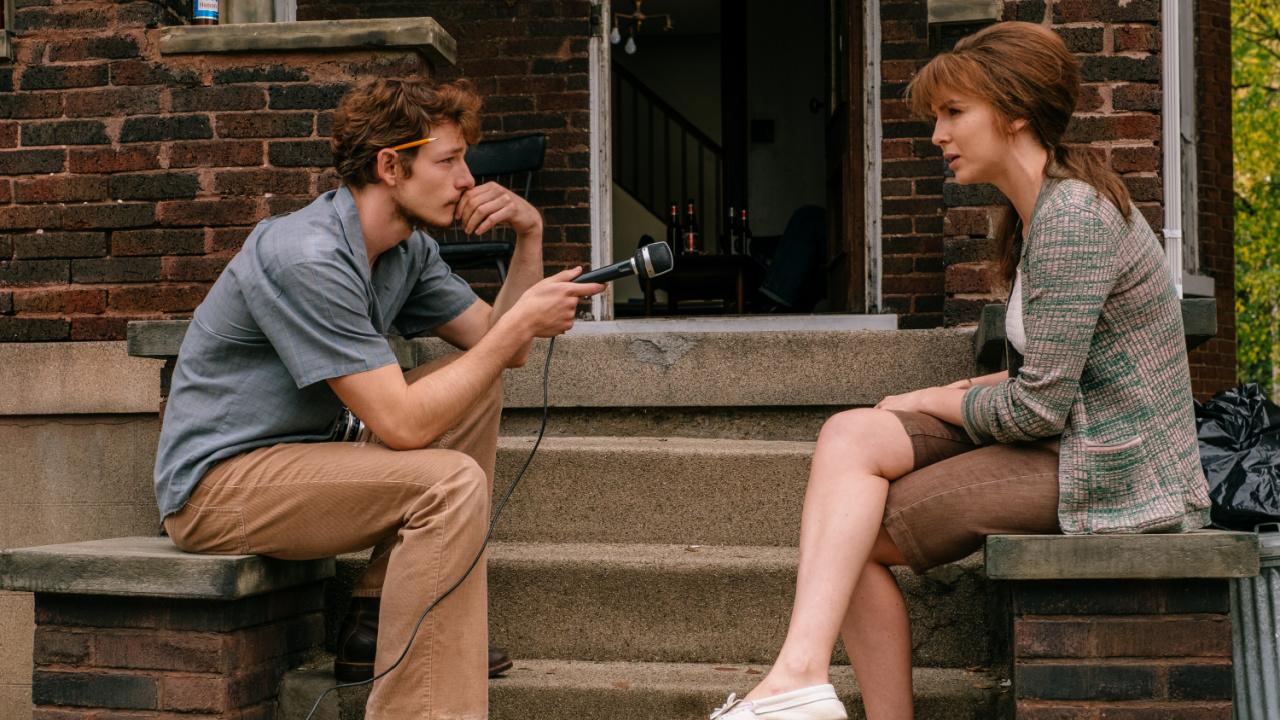
(L to R) Mike Faist as Danny and Jodie Comer as Kathy in director Jeff Nichols’ ‘The Bikeriders’. Credit: Kyle Kaplan/Focus Features © 2024 Focus Features, LLC. All RIghts Reserved.
MF: Can you talk about the choice of telling the story from Kathy’s point of view and utilizing a documentary structure?
JN: The truth is Kathy was just the most interesting one in the book. Her interviews, they just kind of glow and it’s because she’s completely unfiltered. Jodie said something interesting about it. She said, “It’s almost like no one ever asked Kathy what she thought about things until Danny Lyon showed up.” It was a big statement for me to hear. Yeah, this woman in the 1960s, it’s like no one had ever bothered to ask her opinion about anything, and she was ready to give it, and she did in this kind of unvarnished, completely unfiltered way. I think it was undeniable as someone looking at the book to say, “Well, she needs to be the one to take us through this world.” Not because she’s an observer, it’s because she’s a participant. It’s because she’s dealing with the same thing that these guys are dealing with, which is this tension between romance and attraction and violence, which is kind of held in the motorcycle and it’s held in the motorcycle club. As far as the documentary style, it was a real challenge for me as a filmmaker. A lot of my films are classical in the directing style. They’re very linear in the storytelling style. Part of the challenge for me as a filmmaker was, I wanted this to feel like maybe a documentary crew went back in time and captured half of this movie at least. There are certainly scenes that start to fall into more of a narrative feel, but I wanted parts of it to feel like a documentary, which is why beyond even just Kathy’s interviews, you’re having portraiture with these guys sitting on their bikes kind of explaining things. It was very much set up to feel like a documentary for, like I said, about half of the film. At some point you wake up into the narrative and you have a better understanding of these characters because of the time you’ve spent with them. It was a strange tightrope to try to walk as a storyteller and as a writer, but one I’m proud of in the film.
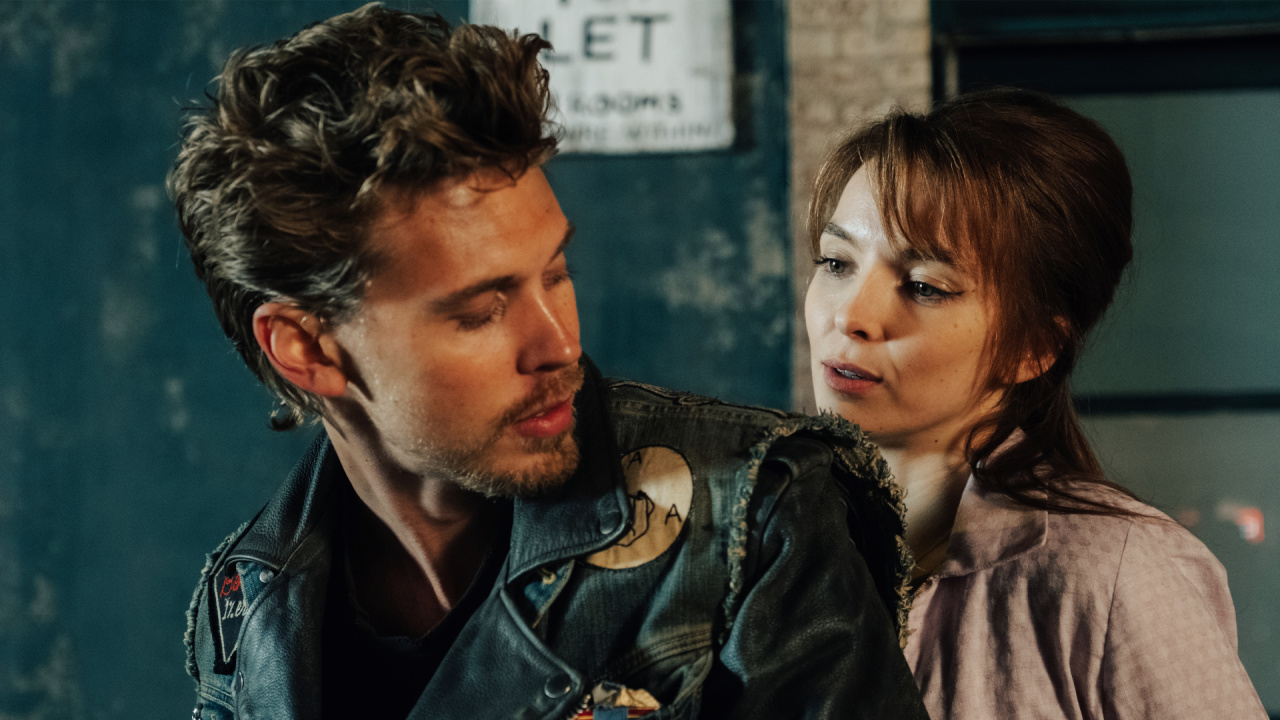
(L to R) Austin Butler as Benny and Jodie Comer as Kathy in director Jeff Nichols’ ‘The Bikeriders,’ a Focus Features release. Credit: Kyle Kaplan/Focus Features. © 2024 Focus Features. All Rights Reserved.
MF: Can you talk about Kathy and Benny’s love story and the incredible chemistry that Austin Butler and Jodie Comer have together onscreen?
JN: These things are magical, and I don’t mean to get kind of too dreamy with my answer, but as a filmmaker, you have very real things in front of you, budgets and schedules, actors, and you look at them and you say, “You look good and you’re a good actor. Let’s see what happens when I put you with this other person”, and then this thing happens. Part of it is they’re both just so talented, but they’re also just so charismatic. I found this with Ruth Negga on ‘Loving’, Jodie’s eyes are disproportionately sized to the rest of her face, which makes her perfect to put on camera because there’s so much information going on inside of her eyes. It’s just a beautiful thing to watch. Then you have Austin who has this supreme control over what he’s doing. When he walks into that bar, turns that chair in and sits down, it looks like something I’ve seen in cinema lexicon, that feels like it’s existed for 60 years. I knew we had something special, and I wish I could tell you that I engineered it and all these other things. It is a magical thing that happens when you put the right people together in the right setting and the right project, and it happened right in front of my eyes, and it was incredible to watch.
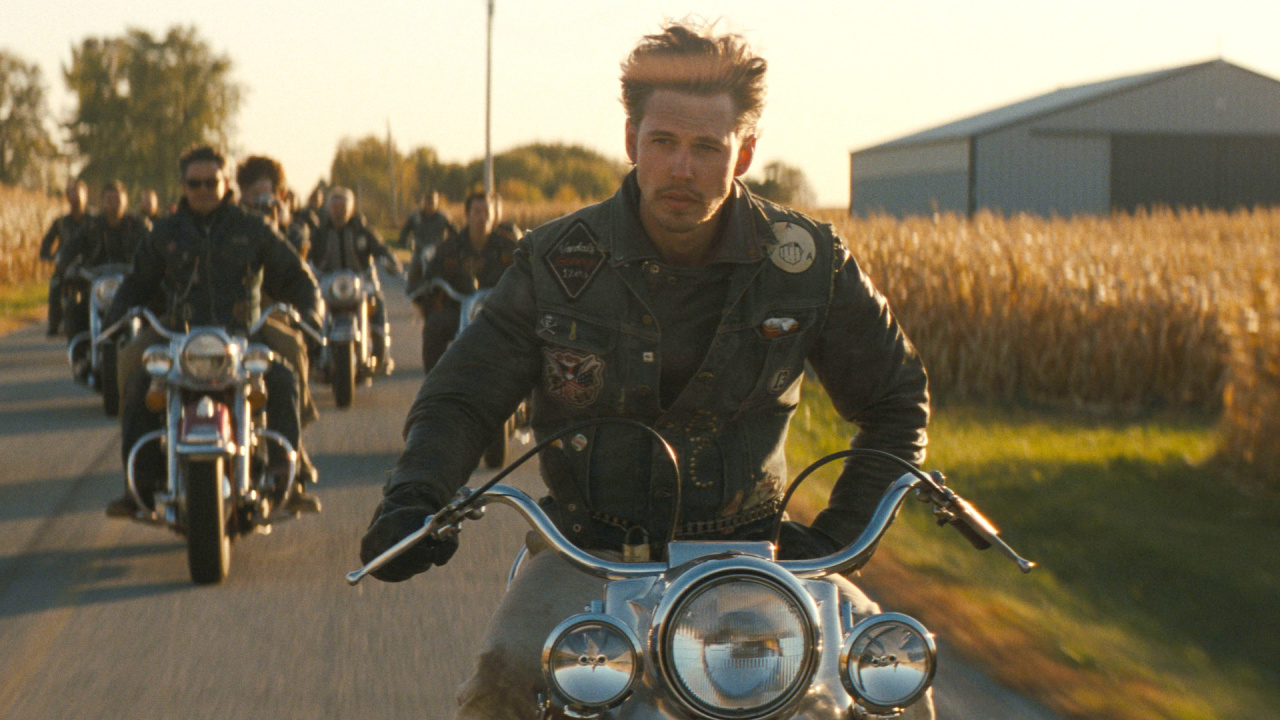
Austin Butler as Benny in director Jeff Nichols’ ‘The Bikeriders,’ a Focus Features release. Credit: Courtesy of Focus Features. © 2024 Focus Features. All Rights Reserved.
MF: Can you talk about the challenges of shooting the motorcycle scenes and because of the period setting of the movie, needing to have very famous actors ride bikes without helmets? Was it difficult just getting insurance for the film?
JN: It was. We had a person on set whose whole job was just to coordinate with the insurance companies. At some point we collectively, the actors, the production, the studio, the insurance companies, everyone had to just accept a certain amount of risk, which as a director is terrifying because we’re just making a movie. It’s not worth hurting anyone, but when you put people on motorcycles, you’re never going to reach zero risk. So basically, we collectively had to accept that there was risk, and then move from there, do everything possible from there to make this experience as safe as possible. It was terrifying, I mean, it took years off my life. You film those scenes the way that you film stunt sequences, if you get it right, you’re done. That’s your one shot. You don’t go back for another take, to just see if something else happens, you just get it. Like the bike shot of Austin, I believe we did that in two takes and I would’ve loved a third take, but we got it in the first take, and it was like, “We’re not going to do that again. We’re going to let this be.” The truth is a lot of that credit goes to our actors for the time they spent training on those bikes. Again, you must give credit to Austin, who’s not a stunt performer. He hasn’t been on these bikes for that long, but he makes himself look so comfortable while he’s riding. That is acting because I guarantee you, he doesn’t feel that comfortable on that bike. But he sold it and I’m so proud that we did it that way. I’m so proud that it’s in the film. In an age where everything is CG, everything is fake, I can’t help but think people will show up and watch this film and know somewhere in their brains that we did that.
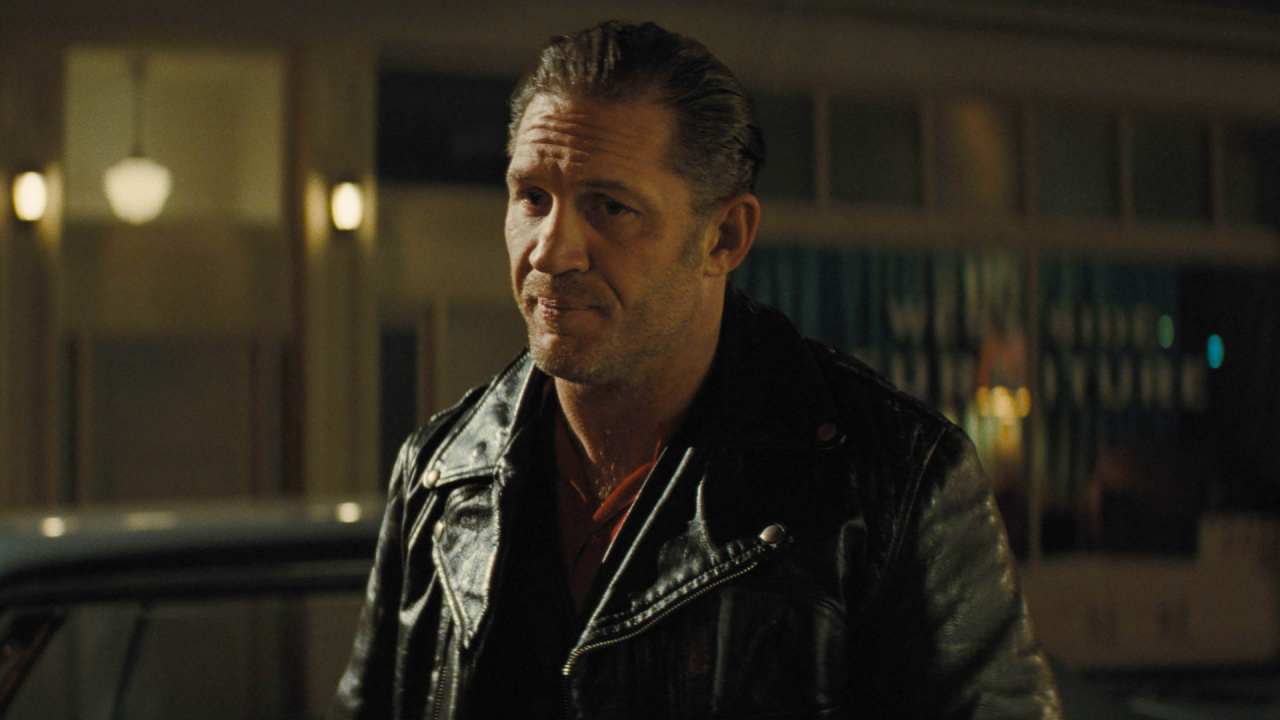
Tom Hardy stars as Johnny in director Jeff Nichols’ ‘The Bikeriders,’ a Focus Features release. Credit: Kyle Kaplan/Focus Features. © 2024 Focus Features, LLC. All Rights Reserved.
MF: In the film, Tom Hardy’s Johnny is inspired to start the motorcycle club after watching Marlon Brando in ‘The Wild One’ and it seemed like Hardy was channeling Brando for his performance. Is that accurate and is that something you talked about with him?
JN: Yeah, it was a bit of his calculus. I think Jodie was sharing audio clips with me all along of the work that she was doing, but that’s because she had about an hour of actual audio of the real Kathy. So, she had something specific to go off. Tom didn’t. There was only one interview with the real Johnny, and we didn’t really like his voice. So, Tom was kind of, he had all the other audio examples to listen to, so he knew the world that he’d be living in, but he wanted to develop something for his character. What he kept saying to me was that he can’t be half a gangster. That seemed to be the mantra that he applied to his character, meaning this guy is, he’s not really a gang leader. He’s a guy that’s posing as a motorcycle gang leader, and that’s going to come back on him at some point because he’s not really built for this world. He’s playing a part. So, you have Tom Hardy playing the part of a person playing a part. Tom very clearly was like, “I think this guy grew up on movies. I think he grew up watching James Cagney. I think he grew up watching Marlon Brando, and I think he is putting on a persona.” So, he very intentionally took his voice into that higher inflection, and basically, it’s Johnny doing Brando. I didn’t hear his voice until the first day on set, and he only had a couple lines, and we kind of huddled afterwards. He said, “What do you think?” For me, it was like Domino’s kind of falling backward because I understood we had had all these conversations. I understood exactly what he’s connecting to. It’s like, “I think it’s great, man. Just go with it.” It adds this odd vulnerability to that character. Imagine him only just being gruff, it is less interesting, I think, in my opinion.
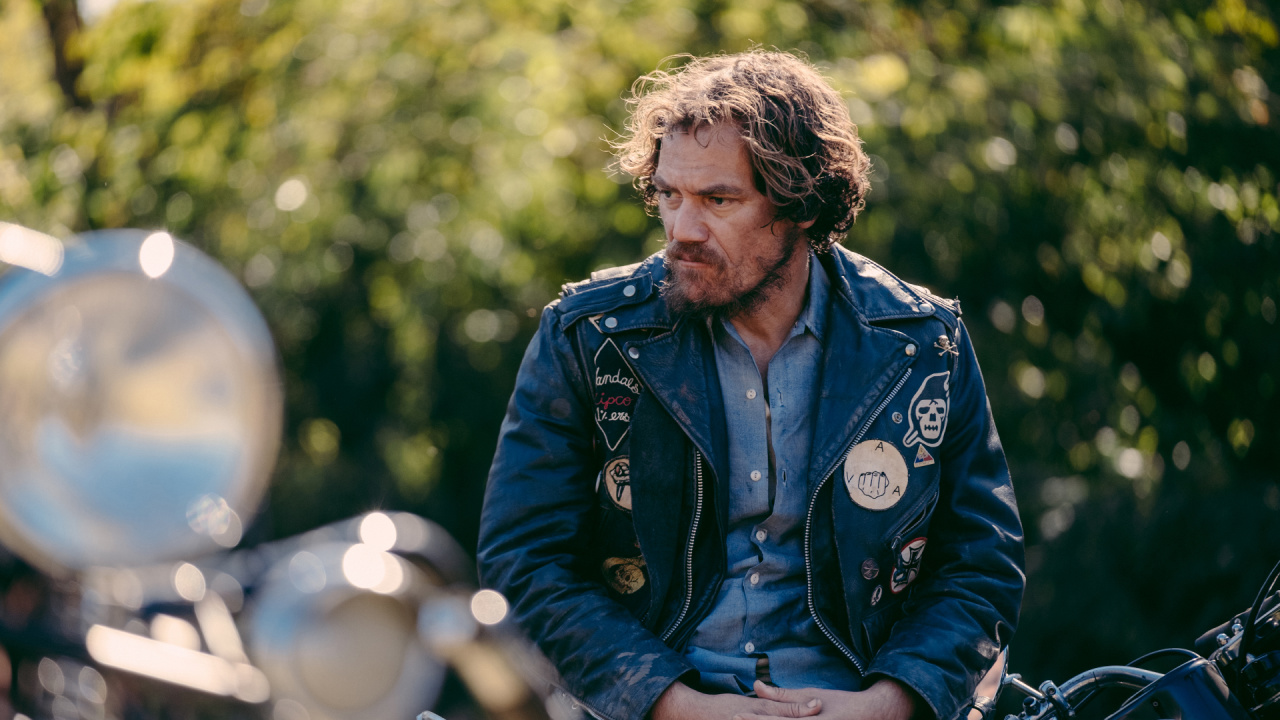
Michael Shannon as Zipco in 20th Century Studios’ ‘The Bikeriders’. Photo courtesy of 20th Century Studios. © 2023 20th Century Studios. All Rights Reserved.
MF: Finally, you’ve cast Michael Shannon in every movie you’ve ever directed. Can you talk about why you love working with him and having him on your sets?
JN: Well, the set part, he adds a level of focus to everybody. We filmed his two monologues in the first week and getting this incredible group of actors together, who I’m not familiar with, who I haven’t done a lot of work with, but having everybody sit around and listen to Mike give a monologue, two monologues in a Jeff Nichols film, it was like a grounding force to the whole production, and it kind of set the bar. It was like, “Okay, we’re in a Jeff Nichols film now. We just heard Mike Shannon give a monologue”. I know that the younger actors look up to him, but Tom as well. He and Tom, I think I’ll get this correctly, they used to be in an acting troop together that Philip Seymour Hoffman led, so they knew each other. Austin tells a great story of about three takes in on Mike’s first monologue, the one leaning on the bike, Tom leaned into him and said, “Oh, he’s in it now.” It was a great actor recognizing another great actor for being in the moment. That’s always the case with Mike. I’ve learned to direct because of Mike, and the truth is he makes me look better. He makes my dialogue better. He’s so thoughtful. But you hear a lot about these actors that they’ll show up and rip out the script pages and start to do their own thing. Look, to each their own, but Mike has a tremendous amount of respect for the words that I write. He knows how much time I spend, and he likes the words I write. They make sense to him the way that I think and the way that I write dialogue and character behavior and movement, they seem to make sense to Mike. So, when he shows up, he’s taking what’s on the page and just bringing it to life in a way that I love the way it looks and sounds and moves. He makes all my work better every time. He doesn’t miss.
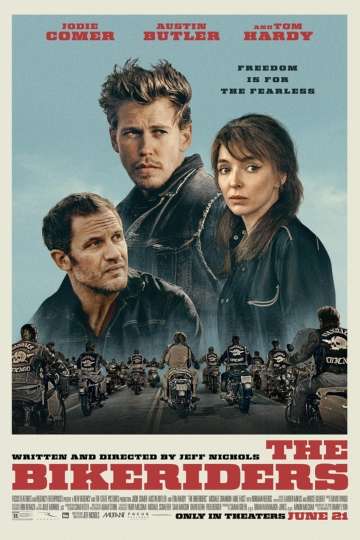
What is the plot of ‘The Bikeriders’?
‘The Bikeriders’ captures a rebellious time in America when the culture and people were changing. After a chance encounter at a local bar, strong-willed Kathy (Jodie Comer) is inextricably drawn to Benny (Austin Butler), the newest member of Midwestern motorcycle club, the Vandals led by the enigmatic Johnny (Tom Hardy). Much like the country around it, the club begins to evolve, transforming from a gathering place for local outsiders into a dangerous underworld of violence, forcing Benny to choose between Kathy and his loyalty to the club.
Who is in the cast of ‘The Bikeriders’?

‘The Bikeriders’ will be available to own or rent at home beginning July 9th.
Movies Similar to ‘The Bikeriders’:
Buy Austin Butler Movies On Amazon
Read the original article here
